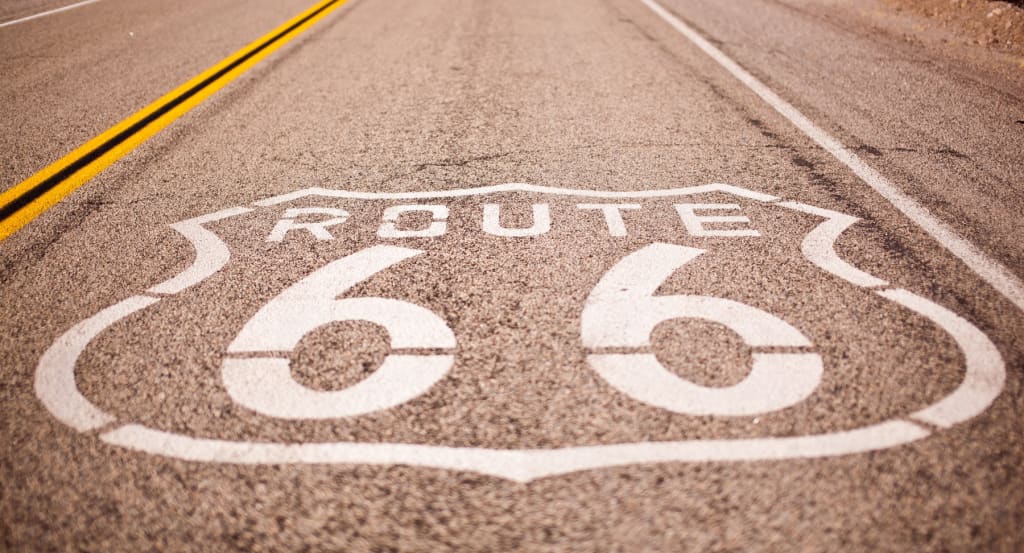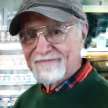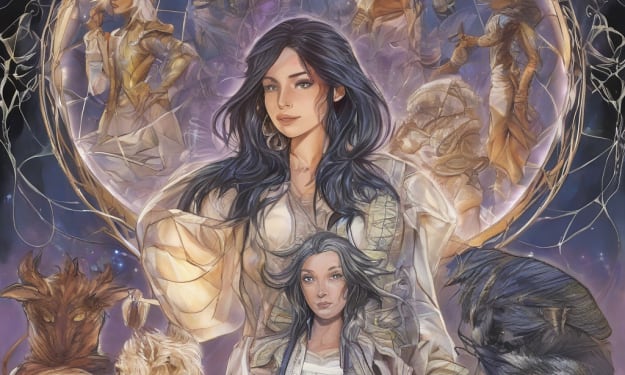A Short Walk West
An Old Memory Revisited

For the past several days since I arrived, he has been telling stories. Terminal tales he calls them. I am amazed that he can joke about it. I am equally amazed that he is talking so much. In just these few days, he has spoken more to me, it seems, than in all the years since I was born.
I look at him now lying in the big, double-bed which he had shared for so many years with my mother, a gaunt impersonator of the father I remembered. For most of my life I considered him a tight-lipped, somber man, too intent upon slaving for the future to nurture the present or dwell on the past. Now, realizing that there is little future left, he seems eager, even compelled, to talk about the past. Not the past which I witnessed but the past of his own growing up.
“Did you know that I always wanted to be a cowboy?” he asks in a raspy voice.
“I know that you worked around horses at Uncle Jake’s place when you were a kid,” I answer.
A memory snakes its way up through layers of time: my father accompanying me to the Saturday matinees at the Will Rogers Movie Theater, sitting beside me instead of dropping me off as other parents did their children. I later wondered how this immigrant American, not yet 30-years-old then, could sit through a western double-feature in a movie house filled with noisy, squirming children.
He tells me he first heard about cowboys and Indians as a lad of seven in the small Ukrainian village where he lived with his father, two brothers and five sisters. An agent for the White Star Steamship lines came to tell the residents how easy it was to go to America. The agent had been there himself, he said, and had learned all about that great new country including the vast American West and its cowboys and wild savages whom he described in colorful detail, not explaining that the Wild West lived on only in books and magazines.
My father was enthralled by the agent’s vivid descriptions. He could see the cowboys in their tall hats, Indians in their feathered headdresses. That mental image of the American cowboy had been flawed, he confesses to me. Tall hats they wore, to be sure, but the tall hats he had imagined were those worn by the Russian cavalry.
After listening to the agent of the steamship line, his father—my grandfather—decided to go to America. He sailed with his eldest son, Jake, intending to earn enough money to bring the rest of the family over. Before he could manage, the assassination of Archduke Ferdinand of Austria set the world on fire in the conflagration now dubbed WWI. It was five long years before my father’s dream of becoming a cowboy in America would have its beginning.
I have never heard such detail before about my father’s coming to America. He slows his narrative and stares out the window as if he were once more aboard the S.S. Mauritania looking out upon the icy waves of the Atlantic. I gently shake his shoulder and ask him what happened next.
“Next?” he asks. “What next?”
“When you were a boy in America,” I say. “Why did you come to St. Louis? Why didn’t you go all the way out to Texas or Arizona?”
“Ah,” he says, “I would have gone if it had been up to me, but I was the youngest, a boy of thirteen. I went where the family went, to St. Louis where my father was.”
He motions for me to give him a drink of water. I fill his glass from the pitcher on the bedside table. On this table are medicine vials of various sizes looking like chessmen in disarray. Leaning forward, he sips slowly through a straw. It is an effort, I can see, even from his propped-up position on the big double-bed. When he finishes, he falls back into the pillows with a groan.
He resumes his story in his weak, husky voice that I remember as once having been so deep and forceful. In fact, my own voice sounds very much like his did then, except that I, born in this country, never interchange my v’s and w’s as he sometimes did. “A wery nice voman,” he would say when not concentrating on the proper pronunciation.
“Your grandfather you never knew. He died before you were born,” he says. “When I came to this country, he already had another wife, a widow with a daughter from before him, who didn’t want me living there, so I went to live with Jake.”
My father explains that his brother, Jake, was a horse trader. He owned a fenced-in, three-acre lot at the outskirts of the city containing a ramshackle stable and two-bedroom frame house. Jake knew that horses as a mode of transportation would eventually be a memory. However, there were still plenty of businesses using horses, and he saw his present venture as a means of earning enough money to acquire the business he really wanted—trading automobiles.
Jake permitted my father to stay with him on the conditions that he go to school and work around the place to earn his keep. My father would have stayed with Jake on any condition, he tells me, because of the horses. He was drawn to them like metal shavings to a magnet.
As he talks about those horses, especially when he describes riding them bareback around the small pasture, my father’s illness-dulled eyes shine with an inner glow. For that brief interlude, I know he is floating in a painless past that is warm, sun-drenched, untroubled. I rearrange his pillows and give him a dose of the pain medication he needs.
By the time he was sixteen, he continues, he had become an accomplished wrangler, never tiring of the horses or the chores necessary to care for them. He had asked for and received permission from Jake to quit school and work full time for wages. Not the least reason for Jake’s ready acquiescence was my father’s willingness to work for less than someone else might demand. Even so, Jake did have another hired hand, Moish, who had come to work for him the previous year.
It came as a complete surprise to my father when one day Jake announced that he was arranging to sell everything—business, barn, house and horses. It surprised Moish, too. He had emigrated from his native Poland where he had been an apprenticed blacksmith and had been overjoyed to find employment at Jake’s. He knew only a few words of English. Both Jake and my father communicated with him in Yiddish, the common Jewish vernacular, but they soon discovered that poor Moish was slow-witted in any language. Although Moish was three years older, my father became his mentor, enlightening him on things American, and Moish, in his lumbering, good-natured way, was happy to listen and follow.
"A gutte neshuma," my father says, Yiddish for good soul.
My father, whose Americanized name was Leo, at a few months past his sixteenth birthday was thin, tough and wiry as a colt, his description. He had thick, brown hair growing straight back from his high forehead in tight wavelets. His angular face with unshaven fuzz over his upper lip was remarkable only for the deep scar at the side of his left eye, a souvenir of the shelling of his Russian village during the shifting tides of war.
Moish, slightly taller, was much more powerfully built with muscular shoulders and huge hands. His face was flat, with a once-broken nose, and his small, deep-set, porcine eyes gave him a sinister look that belied his mild, childlike manner.
After Jake informed him that the sale of the business was imminent, my father continues, he decided it was time to head West. He would make good his long-cherished dream to become a cowboy. He spoke of his plan to Moish, extolling the glories of the Wild West, drawing vivid word pictures of the land of the purple sage as a wondrous place without automobiles, where one’s faithful horse served as both loyal companion and trusted transportation.
He spent a few precious pennies of his hoarded-up savings to treat Moish to a movie featuring William S. Hart dashing across the silent, silver screen. He noted with pleasure Moish’s rapt expression as he watched the spectacle in the flickering light. Moish soon became a convert to my father’s proselytizing. He agreed—no, begged—to come along. The two decided not to tell anyone of their plan, especially Jake. With his mind mired in the sensible and practical, Jake most certainly would try to stop them.
As my father pauses in his narrative, the sun breaks out of its imprisonment in the leaden, overcast sky and sends slats of gold across the bed through the open blinds. Bright sunlight floods his face, giving him a momentary look of glowing vitality, dispelled just as quickly by the deep shadows around his sunken eyes and cheek bones. He turns toward the window and begins again.
It was just such a warm, September day, he tells me, when Moish and he began their westward journey. His plan was a marvel of simplicity. Since neither he nor Moish had money for bus or train fare, they would walk in a westerly direction, sun at their back in the morning, sun in their eyes in the afternoon. Together, they walked as the sun climbed, watching the signs of city life grow sparse. Although he had not known it at the time, my father had selected precisely the correct road on which to head west, Route 66, later made popular in a song of the 1940's.
He does not go into great detail about their trek. But as he speaks, I see the two of them, both dressed in Jake’s cast-off clothing which strains to cover Moish’s bulk and hangs about my father, Leo, like clothes on a scarecrow. They trudge along the well-traveled road passing fields waiting to be harvested or lying fallow, cows along fences stolidly munching on grass.
Their conversation would have been in Yiddish. I imagine Moish asking if they were there yet, and my father patiently explaining to his slower, older companion that it was still a little further, neither realizing how far they would have to walk. A dream, after all, cannot be measured in miles. My father continues his story, and my imagination adds embellishment to his simple, straightforward narration. I visualize it as it happened.
The sun along Route 66 was high overhead when they decided to rest and have something to eat. Since food taken from Jake’s place would have given them away, they had secretly filled their pockets and my father’s knapsack with apples from the orchard across the road. That would hold them over until supper. When that time came, young Leo would think of something. They sat in the shade of an oak tree on an embankment above the road.
An automobile slowed as it passed them. Moish excitedly pointed to the car and exclaimed that inside were cowboys wearing hats that looked just like the one worn by William S. Hart in the movie they had seen. Leo, proud of his hard-earned ability to read English, explained that these were not cowboys at all. The car was a State Highway Patrol car, and the men inside were wearing their police hats, which, even today, resemble those worn by the Royal Canadian Mounted Police, but blue in color.
The car drove on slowly for a few yards, then made a U-turn and stopped on the road just below the embankment. Two policemen climbed warily out of the big, black sedan and motioned for Leo and Moish to come down. One of the troopers had his hand resting on his open holster in the ready position.
Moish said rapidly in Yiddish that surely they must be cowboys since they both were wearing pistols on their belts, tall hats and black boots. Is not that what cowboys wore? Leo answered, also in Yiddish, that cowboys rode on horses not in black sedans. These were policemen, but what they wanted with them he could not guess.
As he was talking to Moish, Leo noticed the two troopers exchange glances and nod. Without warning, the taller of the two men drew his revolver and pointed it at them. Instinctively they raised their hands in the universal sign of surrender, both remembering police in their native lands.
“Don’t move,” the trooper said, keeping a sharp eye on Moish who was more bewildered than usual and kept asking Leo what was happening. This seemed to excite the policeman even more.
“Enough of that foreign jabber,” he said. “Shut your mouths and don’t open ’em again.”
Leo translated the command, and Moish complied instantly, his small eyes bulging as his lips compressed tightly.
“You, too,” the trooper snapped at Leo. “Tim, see what’s in that knapsack.”
The other trooper picked up the knapsack and peered inside. In it, Leo had stashed the apples, a big-little-book of the adventures of Wild Bill Hickock, plus his prized possession—a toy cap-pistol which was a full-sized replica of the six-shooter used by Wild Bill.
“Holy Geez, there’s a gun in here!” the trooper shouted. “The son of a bitch has a gun. It’s them all right.”
He dropped the knapsack and yanked Leo’s arms down. His partner did the same to Moish. They hastily handcuffed Moish to Leo and herded them into the car. Both boys were terrified. They sat there as the car sped down the road, mouths tightly clamped as if welded shut.
Minutes later in the Highway Patrol office, a one-room, brick building next to a hardware store, another policeman, behind a scratched, scarred wooden desk, watched as their captors hustled Moish and Leo in.
“What do we have here, Kunkel?” the man behind the desk asked. He was a big man with a florid face and the beginnings of a nice paunch pushing out the gleaming black leather belt.
“We captured them on 66, Lieutenant, about three miles east of here,” Kunkel replied. He was the taller of the two troopers, the one who had drawn the revolver on them.
“And who might they be?”
“Why them escaped prisoners from Marion. The ones we got that bulletin on,” Kunkel replied.
“They’s two of them and they was talkin’ foreign, like the bulletin said. Two foreigners,” the trooper named Tim said.
The lieutenant turned to Leo. “How old are you, son?”
“Sixteen,” he replied.
“And you?” he asked Moish who looked to Leo for translation. Leo quickly answered for Moish.
“He is nineteen, but he don’t speak wery good English.”
“See, Lieutenant, I told you they was foreigners,” Kunkel said.
“Kunkel, you must have shit for brains,” the lieutenant said. He picked up a piece of paper from the desk and waived it under Kunkel’s nose. “Did you even read this bulletin? It says the wanted men are 28 and 33. Does this kid look like he’s anywhere near those ages? And it says that one is six-foot-one and the other five-foot-six. Both of these boys look about five-nine. Right?”
“But they was carrying a gun, Lieutenant.”
“A gun? Well, that’s a cat of another color. Where is it?”
Kunkel’s partner shoved the knapsack across the desk. The lieutenant lifted the pistol out of the bag, looked it over closely, hefted it in either hand, then casually pointed it at Kunkel and pulled the trigger. There was a loud “pop,” and Kunkel flinched, turning as white as the bulletin on the desk.
“You looked at this gun just about as close as you did that bulletin,” the lieutenant said in disgust. “It’s a goddamn toy. Didn’t you see that?”
“Looked real in that there bag, Lieutenant,” Trooper Tim said. The lieutenant frowned at him and then turned to Leo again.
“What were you boys doing out on the road, anyway?”
“Ve are going out Vest,” Leo answered.
“And the gun? You wasn’t figuring on holding up any stores along the way, were you?”
Leo, realizing the implication, turned a serious face to the lieutenant. “Ve are going to be cowboys, but not outlaws.”
“And how did you intend to get out West?”
“Valk.”
“Do you know how long it would take you to walk all that way?”
“Two, three days?” Leo asked hopefully.
The lieutenant smiled. “Better tell me where you live, son.”
Leo dutifully gave Jake’s name and address.
“Looks like you’ll have to postpone your trip until you’re a little older,” the lieutenant said kindly. “Kunkel, since you picked up these two boys by mistake, you’ll just have to drive ’em back home.”
As I watch him talk, I can tell that my father has slipped all the way back to that incident and is reliving it, action for action, word for word. And I, too, can see that eager, sixteen-year-old immigrant boy named Leo more clearly than I ever did the father I had known.
The sun by now has moved lower in the sky and no longer squints through the blinds. Like the diminishing light in the room, my father also seems to fade. The luster in his eyes, memory-induced, dims. He sinks back into the pillows, his breathing labored. His eyes close, and he drifts off, probably into some other memory which, God willing, I will hear tomorrow.
The End
About the Creator
Edward Farber
Published books: Echoes of Clara Avenue, a short story collection, Looking Back with a Smile, humorous memoir, The Man on the Stairs, four short stories, and Baron & Brannigan, Book 1, a novel set in the 1890s.Visit www.EdFarberAuthor.com.






Comments
There are no comments for this story
Be the first to respond and start the conversation.